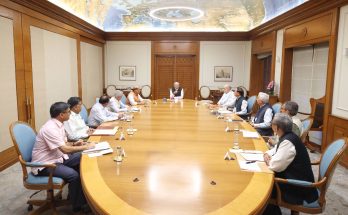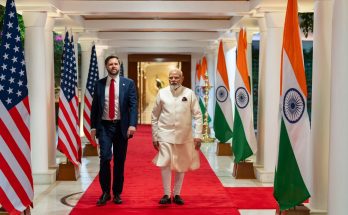 PRETORIA: Zero tolerance for terror and unilateralism – this was the overarching message that has emanated from the BRICS Foreign Ministers’ meeting in Pretoria, setting the tone for the July 25 summit of the leaders of emerging economies.
PRETORIA: Zero tolerance for terror and unilateralism – this was the overarching message that has emanated from the BRICS Foreign Ministers’ meeting in Pretoria, setting the tone for the July 25 summit of the leaders of emerging economies.
India has placed increased counter-terror cooperation at the heart of the BRICS summit agenda and has joined other emerging economies in opposing the “new wave of protectionism,” which threatens to undermine rules-based international order.
The foreign ministers of Brazil, Russia, India, China and South Africa met in Pretoria on June 4 to forge a joint BRICS approach to a host of pressing global issues, including growing protectionism by the US and some developed countries, terrorism, the UN reforms and geopolitical hotspots, including Syria and North Korea.
Mrs Swaraj focused on expanding intra-BRICS counter-terror cooperation by swiftly implementing BRICS-counter terrorism strategy.
“PM Modi had given a call for a BRICS Counter-Terrorism Strategy for joint-action with a focus on money laundering, terror financing, cyber-space and de-radicalization as our priorities,” Mrs Swaraj said at the meeting.
“Our leaders have also called for making UN Counter Terrorism framework efficient and effective. We reiterate our commitment to implement our Leaders’ mandate on counter terrorism under South Africa’s BRICS Chairmanship,” she added.
“They urged concerted efforts to counter terrorism under the UN auspices on a firm international legal basis, and expressed their conviction that a comprehensive approach was necessary to ensure effective fight against terrorism,” a joint press statement said.
“They recalled the responsibility of all States to prevent financing of terrorist networks and terrorist actions from their territories,” it said.
In a triumph for India, the last BRICS summit in Xiamen in September 2017 came out with a strong joint declaration that for the first time mentioned Pakistan-based terror outfits working against India. With the rising spiral of terror spreading across regions, terrorism is expected to be one of key issues on the agenda of the BRICS summit in South Africa on July 25.
 Forging a joint BRICS response to protectionism figured prominently in the discussions between the BRICS foreign ministers. Alluding to US President Donald Trump’s aggressive trade policies, the foreign ministers highlighted the incompatibility of unilateral measures with World Trade Organisation rules.
Forging a joint BRICS response to protectionism figured prominently in the discussions between the BRICS foreign ministers. Alluding to US President Donald Trump’s aggressive trade policies, the foreign ministers highlighted the incompatibility of unilateral measures with World Trade Organisation rules.
They extended their support for an inclusive world economy, where free and fair trade will help all the economies in the world to enjoy the benefits of globalization, said the statement. Russia’s Foreign Minister Sergey Lavrov said: “Our common position is that we have zero tolerance for unilateralism”.
The foreign ministers also expressed concerns arising in West Asia with regard to the Israeli-Palestinian conflict and supported the forthcoming US-North Korea meeting to de-escalate the crisis over North Korea’s nuclearisation. The ministers also backed the Joint Comprehensive Plan of Action deal to end Iran’s nuclear weapons programme from which the US withdrew in May.
The foreign ministers underlined enhanced cooperation in fast-tracking global governance architecture, with special focus on UN Security Council reforms to increase the representation of developing countries in the UN. However, China and Russia did not present their clear stance on the bids by India, South Africa and Brazil for permanent seats in the UNSC.
“China and Russia reiterate the importance they attach to the status and role of Brazil, India and South Africa in international affairs and support their aspiration to play a greater role in the UN,” said the joint statement of foreign ministers.
Going ahead, the BRICS summit in South Africa is expected to focus on deepening BRICS solidarity on geopolitical issues.
“We need to find inclusive negotiated solutions to conflicts,” Minister for International Relations and Co-operation Lindiwe Sisulu said.
“The world is facing unprecedented changes, and there is an expectation for BRICS to play a bigger role,” said China’s Foreign Minister Wang Yi.
Author Profile
- India Writes Network (www.indiawrites.org) is an emerging think tank and a media-publishing company focused on international affairs & the India Story. Centre for Global India Insights is the research arm of India Writes Network. To subscribe to India and the World, write to editor@indiawrites.org. A venture of TGII Media Private Limited, a leading media, publishing and consultancy company, IWN has carved a niche for balanced and exhaustive reporting and analysis of international affairs. Eminent personalities, politicians, diplomats, authors, strategy gurus and news-makers have contributed to India Writes Network, as also “India and the World,” a magazine focused on global affairs.
Latest entries
 India and the WorldApril 23, 2025Kashmir terror: India hits back at Pakistan, highlights cross-border linkages
India and the WorldApril 23, 2025Kashmir terror: India hits back at Pakistan, highlights cross-border linkages India and the WorldApril 23, 2025The Century of America and India: Growing Together
India and the WorldApril 23, 2025The Century of America and India: Growing Together In ConversationApril 20, 2025India Can Contribute Largely to Development of Morocco’s Defence Industry: Ambassador
In ConversationApril 20, 2025India Can Contribute Largely to Development of Morocco’s Defence Industry: Ambassador India and the WorldApril 2, 2025Mapping Next Steps for BIMSTEC
India and the WorldApril 2, 2025Mapping Next Steps for BIMSTEC







